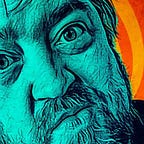Homeostatic
Same, same but different?
More of Ong’s characteristics of an oral society.
“[O]ral societies live very much in a present which keeps itself in equilibrium or homeostasis by sloughing off memories which no longer have present relevance.”
Have you wondered why it’s taken humanity so long to progress?
Unless it has a practical function, most oral people will defy further thought.
It may have been systemic or practical to slough memories off. The effort required to learn and keep useless knowledge takes away from survival: from plowing and planting, from hunting or being hunted, from preparing and planning the long winter.
But now — we slough for different reasons. It’s easier.
“Oh — what was that movie with so and so that had that guy with the horse?” IMDB.com.
“Hey, Google, what does a whale sound like?”
The amount of input we are taking in is too much. The amount of information is piling and piling on top of us all. Add to that, the amount of information we need to sift to find the relevant information. Or the information to inform us if the information we used to find the information is real information? Get it?
No wonder we slough.
However, in offloading, Ong highlights an equilibrium that happens. We become more like our peers and wish things to stay the same. Ask google what homeostasis means.
Not too thrilled
Let me start by saying I’m not happy with some areas that this idea can go. Here lays a pile of darkness on fire on my doorstep. And I feel it’s easy to stomp right into it. But I’m going to choose not to. You can stop reading here and go there on your own. There’s enough out there I’m sure.
So instead I’m going to talk about a possibility I hope for, given we’re not the same as we were.
Homeo — similar
What is similar?
If we are moving into the postliterate and our oral sensibilities are coming back and, if Orality doesn’t generalize and, if Orality is fluid, let me ask again.
What is similar?
Please let it be something else. I want the postliterate idea of this to change with all the options of so many beautiful and diverse commonalities.
I don’t want homeo-algorithms creating systems that funnel us, and label us and lead us into similar ideologies and views. I don’t want my internet to be different than your internet. Yet, with the mountain of “sloughing,” programmers and companies feel like they have no other choice to get us what we “want.”
Instead, let’s go back and think of this:
All of them are Romans. Rome had so much diversity. Heck, they were polytheistic! “A pantheon of gods and goddesses, along with their own religions and rituals.”
It stands to reason that they were kinda cool with not all believing in the same thing, or looking the same way. And at the same time, they were all Romans.
Statis — standing still
Read Who Moved My Cheese. On a good day, most of us don’t like change. There’s a preference for staying with what works.
And yet, given that we have gone through a boom of change over the past 500 years like no other.
But I’ve always had a problem with the idea that this growth we’re in is sustainable. We have the audacity to believe that we are capable of exponential growth in perpetuity. And yet every night we go to sleep. Night comes. Winter comes. Rest is required for life.
I think this pandemic has opened our eyes to this. And funny how out of all of this, slowly recovering, the internet is a buzz on “social audio.”
An oral culture requires our mouths to rest. Our minds to rest. To consume the words from someone else. Oral cultures take their time. They stand still. They prefer it.
Perhaps this is where AI and the future of offloading onto technology open new ways of being. Is our postliterate future one where we learn to stand still — but in a self-driving car?
Homeostasis isn’t opposed to change
The thing about homeostasis is it’s a process that wants stability in a system for survival. Nowhere does that mean it’s opposed to change. Ong chose his words well. When things are good — sure, things slow down. Yet it’s also fast to find new stability and adapt. 200 years is all it took after the fall of Rome to fracture into so many different languages.
Change isn’t easy. Imagine water becoming gas. In flux, the change looks dramatic and violent. And, I think, we’re metaphorically deep in a boiling time. Hopefully, our oral sensibilities are what will help us adapt and find the right equilibrium on the other side.
I have yet to read it, but a previous professor of mine gave me an intriguing summary of Douglas Biber’s Variation across speech and writing. He paraphrased “when we have lots of time, we tend to develop texts that are prose-like; when we don’t, we tend to develop texts that are speech-like, without respect to whether the text is written or spoken.”
When we have the cognitive wherewithal we take it. When we don’t we scream “look out!” And perhaps that’s where we are in our transition?
If was McLuhan is right in the 60’s when he said we were already into this new era, perhaps we’re only about 70 years into this postliterate transition.
130 years left to go to see how we adapt.
